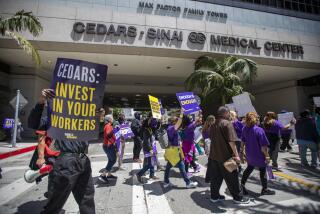Bill puts cap on executive bonuses
- Share via
WASHINGTON — An effort to curb executive pay at the nation’s most troubled banks, inserted at the last minute into Congress’ mammoth economic stimulus bill, has sparked an outcry from financial services groups and others who warn the caps could harm the government’s efforts to revive the economy.
During final negotiations on the $787-billion package last week, Senate Banking Committee Chairman Christopher J. Dodd (D-Conn.) slipped in a provision to limit bonuses for executives at institutions receiving government bailout funds to a third of their salaries. And the bonuses could be paid only in stock irredeemable until the government was paid back in full.
President Obama is expected to sign the stimulus into law Tuesday in Denver. But the White House and Senate Democrats could clash later over the executive pay caps if the White House seeks a legislative adjustment.
The limits go beyond those advocated by the Treasury Department and came as a surprise to Wall Street. Financial services experts are particularly troubled that the caps apply not just to senior executives but to traders, investment bankers, fund managers and others compensated largely through performance-based commissions.
Dodd’s provision also would apply to the more than 350 firms that have received money from the Troubled Asset Relief Program launched by the Bush administration in the fall. It would affect senior executives and as many as 20 of the highest-paid employees of a participating firm.
“We expected compensation restrictions on TARP company executives, but not on the sales force,” said Scott Talbott, head of government affairs for the Financial Services Roundtable in Washington.
Talbott and others warn the measure could trigger unintended consequences -- forcing companies to raise the salaries of executives and traders to dodge the lid on bonuses, for example, or driving talented employees to companies that aren’t subject to the regulation or to overseas banks.
“This will make it difficult to attract and retain top salespeople, the lifeblood of any company,” Talbott said.
The White House is concerned that the provision could prompt financial institutions to repay the government too quickly -- instead of extending credit or loans to consumers and businesses -- to retain and recruit top talent, according to a senior administration official. The goal of TARP, renamed the Financial Stability Plan by the Obama administration, is to get credit flowing again, to strengthen banks, and to provide aid for homeowners and for small businesses.
Dodd, for his part, argues that “the current job market should deter employees from leaving, and if they do, there are many qualified replacements.”
Undeniably, his provision has political and populist appeal. Reports of lavish bonuses paid to top executives at Merrill Lynch & Co. and other firms that received billions in government aid angered Obama and other Democrats.
“Some very high earners will have to adjust compensation expectations,” Dodd says, “and maintain a different sense of proportion than in the past.”
The White House had proposed a cap of $500,000 on bonuses for executives and wanted the restrictions to apply only to institutions that take government money in the future. But Dodd’s measure goes much further, leading to speculation that Obama could seek a change.
“As he has already expressed, the president shares a deep concern about excessive executive compensation at financial firms that are receiving extraordinary assistance from American taxpayers,” White House spokeswoman Jennifer Psaki said in a statement Saturday. “He looks forward to working with Congress to responsibly address this issue. Members of the administration contacted members of Congress with suggested technical changes toward that end.”
Dodd defended his plan by saying: “These bonuses are meant to be performance-based, but too often Wall Street executives took too many risks and made decisions for short-term gains, rather than long-term viability. A car mechanic or teacher in Bridgeport, Conn., should not be paying to subsidize bonuses for their bad decisions.”
Graef “Bud” Crystal, an expert on executive compensation based in California, said Dodd’s approach was too sweeping. The government should target those responsible for the troubles at Citigroup, JP Morgan & Chase Co. and other Wall Street titans, he said -- “the ones whose fingerprints are on the disaster.”
Crystal says the provision could drain the kind of high-risk, high-reward talent that the nation’s top financial firms need as they rebuild. “You are going to end up with civil-service types in there,” he said.
That’s “absurd,” countered Sarah Anderson, a fellow at Washington’s Institute for Policy Studies, which describes itself as a progressive think tank.
“First, in this economic climate, these guys should be happy to have a job -- period,” Anderson said. “Second, we don’t need people in these positions who are only concerned about how many zeros are on their paychecks. We need people focused on getting the country’s economy back on track.”
In fact, some attrition on Wall Street might be beneficial, she suggested.
“These are the guys who presided over . . . more than $1 trillion in U.S. financial losses. Do they really think foreign companies are eager to hire them?”
--
More to Read
Sign up for Essential California
The most important California stories and recommendations in your inbox every morning.
You may occasionally receive promotional content from the Los Angeles Times.













